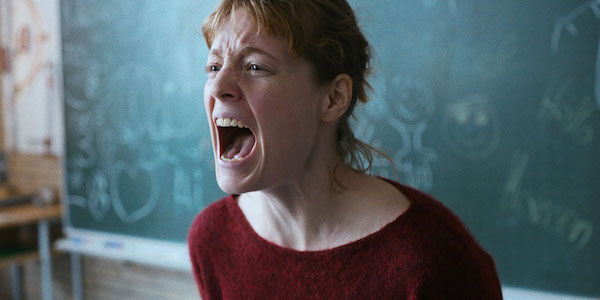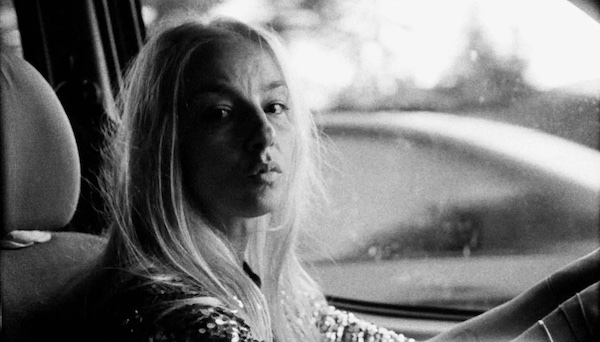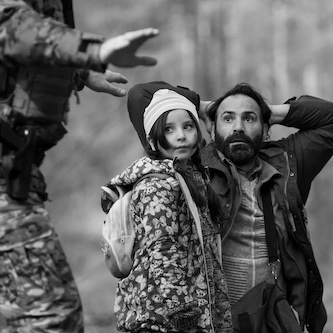Film Festival Reviews: TIFF 2023 — In School, On the Streets, and In the Woods
By David D’Arcy
Reviews of three dark films that probe the crisis of authority, immigration, and feminism in Europe

A scene from The Teacher’s Lounge. Photo: TIFF
We all know about the combative courtroom drama. But what about the embattled classroom drama? In The Teachers’ Lounge, directed by Ilker Catak, we get concentrated doses of both.
Catak’s unsettling film turns its middle school setting into an arena of accusation and judgment, a place where facts fade into institutional gray. Somehow this middle school becomes a lot like what these students will face in the future — or what they will have to learn to accept.
We see this mostly through the eyes of well-meaning Carla Nowak (Leonie Benesch), a new teacher of math and gym — no explanation given for that combination. It all works out well, until it doesn’t. Colleagues with more seniority convene two student representatives to discuss the disappearance of some cash — the first of many tribunals in this film — and they identify a suspect. But the child has an alibi — from his parents — that the money he had was to buy him a present.
But new suspicions arise and Carla sets a trap, via a camera in her computer that’s set near her purse and wallet. The resulting footage spots a hand and a particular pattern of shirt that identifies a school administrator, the mother of another student. This time Carla becomes the implicated party — for spying on a colleague without authorization. Students interview her aggressively for the school newspaper and her fellow teachers let her squirm. Tensions build, not to the point of asserting justice, but to a recognition on the dedicated Carla’s part that standing up for principle comes with considerable risks.
Leonie Benesch will already be known to some for her role as a young nanny in The White Ribbon (2009), Michael Haneke’s chilling saga set on an estate in pre-World War I Germany. In The Teacher’s Lounge the actress starts out her effective performance by playing a lively optimist who can get students to do silly exercises in class. Then the instructor is initiated into bureaucratic politics, forced to confront students and teachers who’ll fight in some cases to keep a potentially embarrassing inquiry from going too far, treading on basic rights to protect themselves.
Ilker Catak, born in Germany to Turkish parents, went to middle school in Turkey. His film will introduce a broader public to the look of the multicultural young Germany of today. His cast provides glimpses into the chilling ways of one institution, a school — not the roots of evil, but the roots of authority.

A scene from Do Not Expect Too Much from the End of the World. Photo: TIFF
The title of director Radu Jude’s latest, Do Not Expect Too Much from the End of the World, sounds like a warning. A lot of the film takes place in cars. Yet much of the time, in dysfunctional Bucharest, Romania, the cars aren’t moving. Somehow that doesn’t keep accidents from happening. That paradox epitomizes Jude’s satiric vision — he likes his comedy black and acidic and laced with obscenities. From Jude, you can always expect that.
In interviews, Jude has called this his feminist movie, built as it is around two working women, both named Angela, both trapped in jobs that range from being frustrating to utter absurdity. Radu edits in sections from Angela Moves On, a 1981 picaresque Romanian film starring Dorina Lazar as a woman taxi driver, earning the “extra money” that crony communism won’t provide. She endures amorous offers and worse from her customers.
The other Angela, from today, is an overworked gig-worker (Ilinca Monolache), who labors day and night as a gofer for a team that’s filming Austrian public service commercials. The Austrian crew is shooting in Bucharest on the cheap to save money. Nina Hoss, the star of Christian Petzold’s films, is young Angela’s tall, blonde, imperious client. Shake well and serve.
There is a third protagonist (along with lots of small players), young Angela’s avatar, Bobita, played by Manolache and reminiscent of the real-life misogynist and sex trafficker Andrew Tate, who spits out vile opinions. Talk in Do Not Expect Too Much is nonstop and often outrageously funny. If that, and visual footage culled from over the last 70 years, threatens to come across as chaos, it can’t compare with the congested and corrupt ambience of the city itself.
Jude’s turn toward feminism isn’t entirely new. In Bad Luck Banging or Loony Porn (Arts Fuse review), which won the top prize at the Berlin Film Festival in 2021, the story, or the delivery system for a story, is a walk across Bucharest by a schoolteacher (caught earlier by her own cell phone having sex with her husband) who hears a wide-range of obscenities on her journey. Then she’s put on trial outdoors (the cell phone footage went viral) and the crowd joins the feeding frenzy — a show trial in a country notorious for show trials.
Do Not Expect Much is almost three hours, and Jude stretches out his long film with a valedictory jab on filmmaking and entertainment, in which young Angela and her crew ask Ovidiu (Ovidiu Pirsan), a man crippled in a work accident, to retell the story of that mishap on-camera from his wheelchair, his supportive family by his side. It’s a tiring, repetitive, and painful narrative; Jude’s mockery of the public service message. But hey, Ovidiu is receiving 1,000 euros for his difficult testimony and Angela is being paid a fee for asking him to repeat it. As Jude might say, “It’s a non-living.”

A scene from Green Border.
With Green Border, Polish director Agnieszka Holland chose to make a film close to home. The border separating Belarus from Poland also divides the violently indifferent Putin-dependent regime of Belarus from a member country of the European Union, which (theoretically) welcomes migrants. A group of fearful refugees gets off a plane in Belarus and they pay dearly to get onto a bus for Poland. Nothing goes according to plan — not their plan, at least. Things just get worse.
These refugees from Syria, Afghanistan, and other places outside Europe are driven to a barbed wire fence where police await to rob them. They’re then pushed through holes in the fence — some are pregnant or carrying young babies — and they run, heading toward Sweden (they think). They have no directions, maps, or functioning cell phones. Eventually they’re picked up by Polish cops, who won’t listen to anything they say — not that the two groups understand each other — and the refugees end up pushed back into Belarus, where they slog through mud to reenter Poland. On both sides of the border protest is punished: anyone who argues with the cops, like the woman who claims that her brother worked with Polish soldiers in Afghanistan, is beaten.
Holland shows us migrants who are caught in a brutal Sisyphean loop. In Belarus, cops keep them around long enough to rob them. In Poland, their stay is short enough for authorities to avoid accountability. With each move, the exhausted and sick refugees slacken their pace.
This would be a vision of despair, but some Poles do help, defying the police to assert the migrants’ rights. Maja Ostaszewska plays Julia, a valiant defender for the refugees; she takes plenty of abuse from the cops for her efforts. Bottom line: Poland is a better place to be a refugee than Belarus, a lot better if you’re among the white Ukrainians fleeing the Russian invasion. That is not news; the film’s drama lies in its scrutiny of the near-endless mistreatment of non-Europeans — on both sides of the border.
Green Border is grim, though surely far less grim than the everyday horrors lived by homeless people on the move. We don’t see rape or mass killings or anything like piles of corpses. What we do see are two countries harming migrants, and trying to hide what they’re doing.
David D’Arcy lives in New York. For years, he was a programmer for the Haifa International Film Festival in Israel. He writes about art for many publications, including the Art Newspaper. He produced and co-wrote the documentary Portrait of Wally (2012), about the fight over a Nazi-looted painting found at the Museum of Modern Art in Manhattan.
Tagged: Agnieszka Holland, Do Not Expect Much from the End of the World, Green Border, Ilker Catak, immigration, Poland, Radu Jude, The Teacher's Lounge
